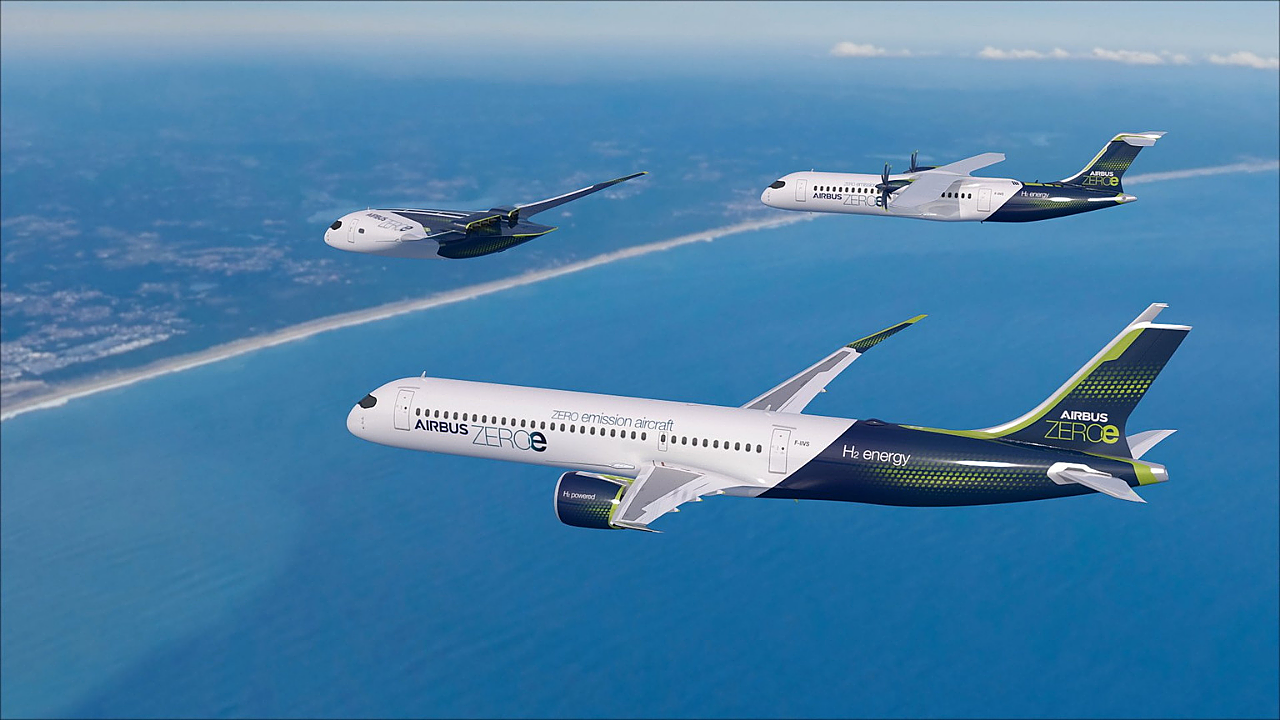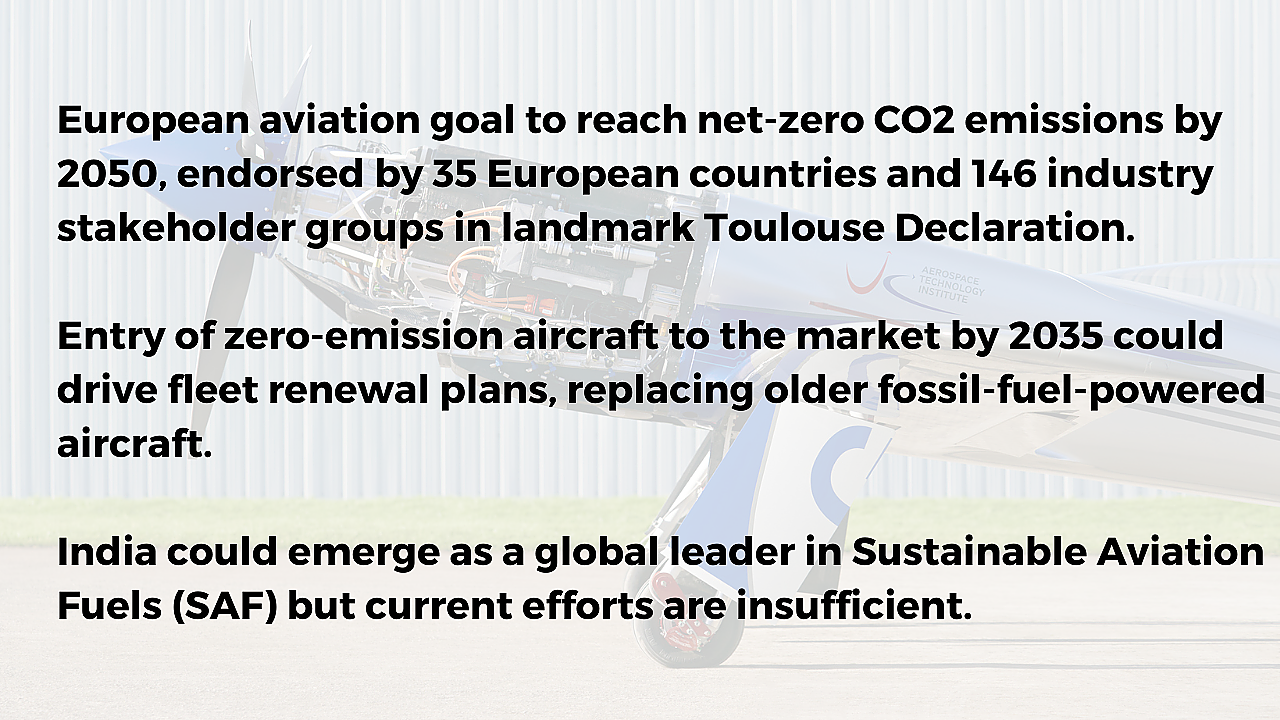
The European aviation goal to reach net-zero CO2 emissions by 2050 has received further endorsement from 35 European countries and 146 industry stakeholder groups, with the inking of the ‘Toulouse Declaration,’ a landmark public-private initiative supporting the industry’s decarbonisation goals, earlier this month.
European Commission and the Member States under the French EU Presidency made the declaration at the Toulouse Aviation Summit, which also saw participation from the US, Canada, Morocco and Japan.
International Civil Aviation Organization (ICAO) Council President Salvatore Sciacchitano stated that it was testimony to the strong commitment to continue to work based on the declaration adopted by Ministers at the end of the high-level conference COVID-19. He also stressed that the focus on a global long-term goal “must not reduce our efforts to pursue the medium-term carbon-neutral goal,” highlighting the ICAO basket of measures being pursued by member states and the particular importance on Sustainable Aviation Fuels (SAF).
A New Dawn
With a net-zero goal, the declaration seeks to establish the necessary conditions and a European roadmap to define the volumes of biomass deposits available for SAF production and the production capacities of synthetic fuel. The declaration also calls for sustained and better research on disruptive aeronautical technologies (aircraft, engines) and creating the necessary regulatory mechanisms to replace aircraft using fossil fuels and to pursue initiatives that optimise aircraft flight trajectories and fuel consumption.

Some steps that the stakeholders will look at include supporting airport carbon accreditation to drive the growth of sustainable airport infrastructure, operations and related services, providing incentives for greater deployment of SAF, in addition to supporting the entry of zero-emission aircraft to the market by 2035, which will drive fleet renewal requirements. To this end, partner nations and aviation association’s will need to ensure that green hydrogen and electricity is available at airports, with the creation of the necessary infrastructure.
Sustainable Aviation Leaders
Europe’s leading aviation associations, Airbus, Air France-KLM, ATR, Dassault Aviation, Groupe ADP, Safran and Thales, who launched the Destination 2050 decarbonisation roadmap, are also part of the industry groups supporting the declaration. Members of these associations will continue to invest in the maturation, development and implementation of decarbonisation technologies and look to institutions to support the development and deployment of innovations. The decarbonisation technologies will mainly focus on more efficient aircraft operations (at airports and while in flight) along with the development of next-generation aircraft configurations and propulsion (all-electric, hybrid, etc) along with SAF and synthetic fuels.
There will be a strong focus on proven public-private research partnership instruments such as Clean Aviation, Single European Sky ATM Research (SESAR), and the French Civil Aviation Research Council (CORAC).
“We urge the European Commission to implement the launch of industrial alliances that will be critical to align the entire ecosystem around this joint ambition, particularly the Renewable and Low-carbon Fuels Value Chain Industrial Alliance, the Alliance for Zero Emission Aviation and the European Raw Materials Alliance,” Airbus stated on behalf of the five aviation associations.
Emerging Opportunity
The Toulouse Declaration further indicates the seriousness with which EU nations are looking to tackle climate change, with one of the major aspects being the decarbonisation of aviation.
India, which is already one of the world’s top aviation markets, now requires firm government policy if Indian companies are to be part of the future of sustainable aviation. Just as Indian airlines have placed large orders for next-generation fossil fuel-powered jetliners, one can be sure that Indian carriers will also be at the forefront of ordering future aircraft that will focus on sustainability. The global aviation industry is already transitioning to a decarbonised future through improvements in aircraft and engine technologies, the development of sustainable aviation fuels, improvements in air traffic management and aircraft operations.

However, Indian industry risks being left behind if there is no concrete policy and financial measures to support the green transformation of Indian aviation, thereby enabling it to partner in the global charge towards net-zero CO2 emissions by 2050. Policy frameworks are a must if Indian industry is to be prepared for the shift to biofuels and new engine technologies (electric and/or hydrogen). Government support is essential in the initial years to cushion the inevitable rise in prices of introducing these new technologies. Urgent measures are needed to support public and private funding to channel investments, R&D and innovation into decarbonisation and create a more sustainable aviation ecosystem. India’s large agricultural base makes it well-suited to emerging as a global leader in SAF, but progress on this front has been slow.
“A new chapter in aviation history is being opened. In committing to reducing the carbon emissions of air transport by 2050, Europe is leading by example. All of us – governments, industry stakeholders, associations – have come together to rally behind this goal. We shall proudly and in unison uphold it on an international level,” said Jean-Baptiste Djebbari, the Minister Delegate for Transport, following the Toulouse Declaration.
Aviation is a global business, and the industry’s decarbonisation has been planned to take place on an international scale, never seen before. Indian industry requires similar vision, commitment and tangible steps taken on the ground to be part of the global aviation industry in any significant measure post-2030.